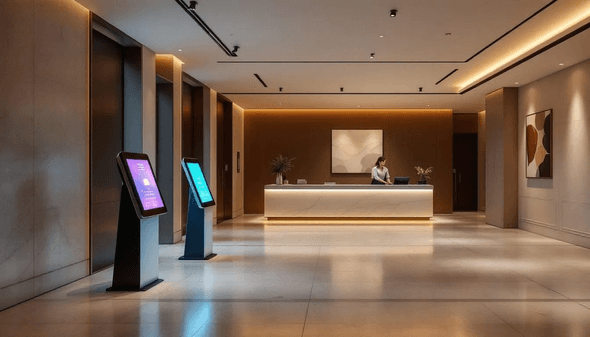What Tools Assist with Automating Guest Screening and Identity Verification: Complete 2025 Guide

Key Takeaways:
Automated guest screening tools use AI-driven ID checks, facial recognition and document verification to prevent fraud and keep bookings secure.
These tools cut verification time from hours to minutes while reducing chargebacks, party risks and fraudulent bookings across vacation rentals and hotels.
Leading platforms like Jurny (Autohost), Authenticate, Enso Connect and Truvi offer fast verification, deep integrations and customizable workflows to match different property needs.
A smart implementation plan — from assessing risks to configuring triggers and monitoring performance — ensures high completion rates and smooth guest experiences.
For property managers in 2025, automated verification isn’t optional anymore. It’s a core layer of security, compliance and operational efficiency.
The best guest experiences begin with trust. Automated guest screening and identity verification tools are essential technologies that help vacation rental hosts, hotels, and property managers verify guest identities, prevent fraud, and ensure secure bookings. In this guide, you’ll learn what these tools are, why they’re crucial for property protection, and how to implement them effectively.
Modern guest screening software eliminates manual effort while providing enhanced security through AI-powered identity verification, document verification, and comprehensive background checks. These platforms integrate seamlessly with existing systems to screen guests automatically, allowing only verified guests to complete bookings.
This comprehensive guide covers what tools assist with automating guest screening and identity verification, key features, implementation steps, and platform comparisons to help you choose the right verification tools for your property management needs.

Understanding Automated Guest Screening: Key Technologies and Definitions
Core technologies
Automated guest screening combines multiple advanced technologies to verify guest identities and prevent fraudulent bookings. Identity verification software uses optical character recognition (OCR) to scan government-issued IDs, while facial recognition technology matches guest photos to their identification documents.
AI-powered identity verification systems employ machine learning algorithms to detect false positives and identify potential risks in real time. Liveness detection prevents spoofing attempts by ensuring guests are physically present during the verification process, not using static photos or deepfakes.
Document verification tools authenticate government IDs, passports, and driver’s licenses by checking security features, fonts, and formatting against official databases. Background checks cross-reference guest data against sex offender registry, criminal databases, and internal watchlists.
Technology relationships
The guest screening process connects multiple systems to create a seamless verification workflow:
Automated screening → fraud prevention → secure bookings → higher revenue.
Identity verification → guest data collection → security deposit automation → streamlined check-in instructions.
Document verification → regulatory compliance → enhanced security → peace of mind.
These verification tools integrate with property management systems (PMS), online travel agencies (OTAs), and payment processors to create automated workflows that require minimal manual intervention.

Why Automated Guest Screening is Critical for Property Management
Automated guest verification delivers measurable security benefits and operational efficiency. Industry data shows that fraudulent transactions can cost property managers thousands of dollars per incident, factoring in property damage, lost revenue, and remediation costs.
Key statistics that demonstrate its value:
Automated screening tools reduce chargebacks by up to 50%
Party-related damages decrease by 30-60% with proper guest screening
Manual verification processes take 2+ hours per booking vs. 5 minutes with automation
Over 65% of major US property management firms will employ automated guest screening by 2025
Regulatory compliance requirements increasingly mandate strict identity verification requirements. Local authorities often require vacation rental operators to verify guest identities for tax reporting and safety purposes. Platform’s ability to ensure compliance while maintaining user-friendly interface becomes essential for avoiding penalties.
The fraud detection capabilities protect against synthetic identities, stolen credit cards and high risk guests who may cause property damage or engage in fraudulent activities.

Guest Screening Tools and Their Key Features
Tool | Pricing model | Verification speed | Key features | Integration capabilities |
Jurny (Autohost) | Custom pricing | Real-time | AI fraud detection, risk scoring, OTA integration | Seamless integration with major OTAs |
Authenticate | Per verification | Seconds | Criminal background checks, automated workflows | Lodgify integration, direct booking focus |
Enso Connect | Tiered pricing | Instant | Customizable vetting, chargeback defense | Extensive PMS integration |
Truvi | Layered packs | Variable | Privacy-compliant, social media analysis | Deep PMS integration, no-journey options |
Imprivata | Enterprise | Real-time | Guest experience optimization, loyalty integration | Hotel-focused integrations |
Accuracy rates for leading verification tools consistently achieve 99%+ success with legitimate guests while maintaining low false positive rates. The user interface design significantly impacts customer satisfaction, with the most effective tools requiring minimal guest interaction.

Step-by-Step Guide to Implementing Automated Guest Screening
Step 1: Assess your screening needs and platform requirements
Before selecting identity verification software, evaluate your specific security requirements and operational constraints. Short-term rental hosts have different needs than hotel chains or luxury property managers.
Essential assessment checklist:
Current booking volume and growth projections
Existing systems compatibility (PMS, OTA integrations)
Regulatory standards and local compliance requirements
Budget for per-verification costs vs. monthly subscriptions
Guest demographic and risk tolerance levels
Some hosts mention challenges with platforms that don’t integrate properly with their existing workflows. Ensuring your chosen tools support seamless integration prevents disruption to established booking processes.
Step 2: Choose and configure your screening tools
Select verification tools based on your property type, guest volume, and security requirements. Many users report success starting with basic ID verification before adding advanced features like comprehensive background checks.
Configuration best practices:
Set up automated guest data collection immediately after booking confirmation
Configure security deposit collection through the verification process
Establish clear onboarding process with user-friendly interface
Create automated check-in instructions for approved verifications
Set up real-time monitoring for high-risk guests
The platform’s flexibility to customize verification requirements based on booking value, guest history, or seasonal factors provides optimal balance between security and user experience.
Step 3: Monitor performance and optimize results
Track key metrics to ensure your guest screening process delivers expected results. Users note that successful implementation requires ongoing optimization based on guest feedback and fraud prevention effectiveness.
Essential monitoring metrics:
Verification completion rates (target: 95%+ for legitimate bookings)
False positive rates affecting customer satisfaction
Fraud prevention success (blocked fraudulent bookings)
Average verification time and guest abandonment rates
Cost effectiveness per verification vs. prevented losses
Regular analysis helps identify when to adjust verification requirements or add enhanced security measures for repeat bookings and trusted guests.
https://youtu.be/T1LEa9TVIiI?si=YHQBY4Yi1vfoDZ4c
Common Implementation Mistakes to Avoid
Choosing incompatible verification tools
Many property managers select platforms without confirming integration capabilities with their existing systems. This creates operational gaps requiring manual effort to bridge verification data with booking management.
Over-screening legitimate guests
Implementing overly strict identity verification requirements can cause booking abandonment. Users feel frustrated when faced with excessive verification steps, especially for low-value or repeat bookings.
Violating platform policies
OTA platforms like Airbnb restrict off-platform communication and verification requirements. Ensure your chosen tools comply with marketplace policies to avoid account suspension.
Pro tip: Start with basic document verification and gradually add features like facial recognition, background checks, and security deposit automation based on your specific risk patterns and guest feedback.
.jpg?u=https%3A%2F%2Fimages.ctfassets.net%2Fpqmtoyw9z10u%2F5Q3KqejgROwEQbPxrduGKk%2Fbb3221e9034859cf60058d12be25920d%2FExample_and_Implementation_Walkthrough__1_.jpg&a=w%3D590%26h%3D377%26fm%3Djpg%26q%3D75&cd=2025-09-09T08%3A41%3A00.848Z)
Sample Case Study and Implementation Walkthrough
A 15-property vacation rental management company struggled with manual guest screening consuming 2+ hours per booking while failing to prevent fraudulent activities. The initial setup process was consuming significant staff time while still allowing problematic guests.
Implementation steps:
Starting situation: Manual ID collection, no background verification, 3 fraud incidents monthly
Tool selection: Chose Jurny’s Autohost for AI-powered fraud detection and OTA integration
Configuration: Set up automated verification requiring guests to upload a government ID and a selfie
Optimization: Added security deposit collection and real-time monitoring for suspicious patterns
Results after 6 months:
Verification time reduced from 2+ hours to 5 minutes per guest
Zero successful fraudulent bookings (blocked 8 attempts)
97% guest completion rate with positive user feedback
$15,000+ in prevented damages and chargebacks
Staff redirected to guest services and property improvements
Metric | Before | After | Improvement |
Processing time | 2+ hours | 5 minutes | 96% reduction |
Fraud prevention | 60% | 100% | 40% improvement |
Guest satisfaction | 3.2/5 | 4.7/5 | 47% increase |
Monthly fraud costs | $2,500 | $0 | 100% reduction |
Key Takeaways
Automated guest screening and identity verification tools provide essential protection for modern property management operations. The five most critical considerations include:
Tool categories: Choose between basic id verification, comprehensive background checks, or full fraud prevention suites based on your risk tolerance and budget
Implementation approach: Start with core document verification and expand to advanced technologies like facial recognition and ai powered risk assessment
Cost considerations: Balance per-verification costs against prevented fraud losses and operational efficiency gains
Integration requirements: Ensure seamless integration with existing systems to avoid disrupting established workflows
Compliance standards: Maintain regulatory compliance while providing enhanced security through verified guest data collection
Next steps: Evaluate your current guest screening process, request demos from leading providers like Jurny, Authenticate, or Truvi, and begin with basic identity verification tools to establish automated workflows.

Build Trust Through Smart Screening
Automated guest screening and identity verification are vital for protecting your property, preventing fraud, and streamlining operations. With the right tools in place, you can ensure secure bookings while enhancing the guest experience.
Remember that successful implementation requires balancing security features with customer satisfaction. Allowing users to complete verification quickly while maintaining strict identity verification requirements creates the optimal foundation for secure, profitable property management.
Start with core verification features and scale as needed. With a thoughtful approach, your property management business can stay compliant, secure, and guest-friendly.
FAQs about Automated Guest Screening Tools
1. What’s the average cost of automated guest screening tools?
Pricing ranges from $0.93 per verification (basic id verification) to $1.35+ for comprehensive background checks. Enterprise solutions offer custom pricing based on volume and feature requirements.
2. Do these tools integrate with Airbnb and other OTAs?
Most verification tools integrate with major booking platforms, though Airbnb restricts off-platform verification requiring creative workarounds through messaging automation and post-booking communication.
3. How accurate are automated identity verification systems?
Leading tools achieve 99%+ accuracy with advanced technology including liveness detection and machine learning algorithms. False positives typically affect less than 1% of legitimate guest verifications.
4. Can small property managers afford these verification tools?
Yes, many providers offer pay-per-verification pricing suitable for smaller operations. The cost effectiveness becomes apparent when considering prevented fraud and reduced manual effort.
5. How do guests receive verification instructions?
Most platforms automatically send verification links via email or SMS after booking confirmation. The user friendly interface guides guests through document upload and identity confirmation within minutes.
6. What happens if guests fail verification?
Failed verifications typically trigger manual review by the support team. Many platforms allow hosts to set custom policies for handling verification failures while maintaining regulatory compliance.
Ready to find out how Hostaway can transform your business?
